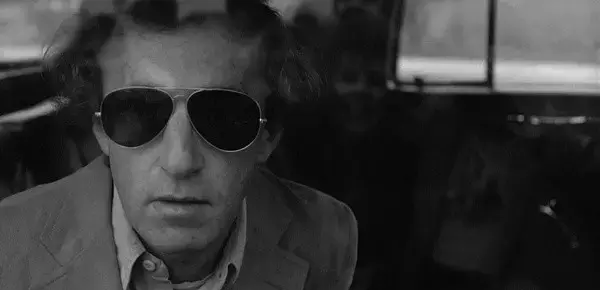Text | Sheng Haoyang
"I don't want to make comedy anymore, I see all human suffering, which is not funny at all," woody Allen says in the autobiographical "Once Upon a Time in Stardust." He then talks to the alien about his early films, and the alien says, "We love your films, especially the early comedies." He replied, "But the human condition is too frustrating."
"There are also some wonderful moments."

Stardust (1980)
But before Anne Hall, Woody Allen's last pure comedy, Love and Death, there were hardly any "wonderful moments" to be seen.
The film has an unusually flat and straightforward storyline, Woody Allen played by the Russian farmer Boris is a cowardly but sincere pacifist, he obsessively pursues his cousin Sonia, but is forced to get involved in the Russo-French War of 1812, he did not fire a bullet, but inexplicably became a hero in the war, a winner of the post-war love scene and an assassin who successfully assassinated Napoleon's stand-in, was thrown on death row, and ended up with the death god who had agreed to die as a child.
Love and Death (1975)
Of course, the story itself isn't too important, because the whole process of absurdity and insanity is mixed with woody Allen and Diane Keaton's laughter and invective, carefully selected puns, and sudden philosophical questions and answers.
Generally speaking, the motif opposite war and death is "love and peace", the afterglow of the Russo-French war is still there, Napoleon occupies Moscow, the beauty of "peace" is gone, and several loves are linked to infidelity and stealing, and have nothing to do with "wonderful" - Sonia thought that Boris's brother Ivan would marry herself, marry an old herring merchant in anger, and look around for fun; Boris and the countess were forced to duel with her lover after a spring supper, and Sonia agreed to marry him, thinking that he would die.
Tolstoy's Russian epic was condensed into several classic elements by Woody Allen, crammed into a film of less than 90 minutes. But the winner of life, Bezukhov, was a Freemason, while Boris was an outright skeptic and atheist.
In Love and Death, a tribute to Bergman can be seen everywhere, Boris's duel scene originates from "Smiles on a Summer Night", and in the final scene, the vertically overlapping facial picture of Sonia talking to her cousin is obviously a reproduction of "Masquerade", and the grim reaper from "The Seventh Seal" changes into a white robe and promises him a goodbye.
The Masquerade (1966)
Woody Allen's God, though not a terrifying spider or a high-sounding covenanter—the apparitioned angel told him that he would be forgiven at the last second before his execution—and the excited Boris even recited the famous verse of Psalm 23, "I have walked through the valley of the shadow of death," but after finding that he had been deceived, Boris did not particularly blame God.
Ultimately, "there are things in life that are worse than death," such as untimely love. The film's love has always been with death: Sonia gambles on the first suitor to marry has a heart attack, cheap herring merchant, and the herring merchant dies in a duel to protect his wife's reputation.
Boris, who was married to Sonia, should have been happy, and as a result he suddenly went to commit suicide, and if it were not for his whimsical wife, he would not have to assassinate Napoleon. So, "to love is to suffer, and not to love is to suffer."
Woody Allen used Prokofiev's Lieutenant Kizhi Suite for the film's score, which he had intended to use Stravinsky's music, but found the soundtrack to dominate. "Lieutenant Kizhi" coincides with the theme of "Love and Death", Prokofiev first scored the film "Lieutenant Kizhi", and then changed the film music to a symphonic suite, the difficulty of composing the music is how to use music to represent a "Lieutenant Kizhi" who never existed.
The angry Tsar sought out the culprit who had woken him up, and the underlings, for misprogramming a "Lieutenant Kiri", blamed the nighttime riots on "Kiri", which led to a series of absurd events of exile, pardon, weddings, promotions, funerals, and debasements. "Lieutenant Kirch" ends up "dead", but since he does not exist, his birth and death are nothing, happiness is nothingness, love is nothingness, even suffering has become nothingness.
The impostor angel that Boris encountered on death row undoubtedly alluded to what happened before Dostoevsky was exiled to Siberia, lao Tuo waited for the tsar's pardon a moment before the execution, and Boris waited for the fulfillment of death's covenant. No matter how much Woody Allen loved Dostoevsky and made all his novels appear in Love and Death, the two had different perceptions of nothingness.
Sonia nagged about the "two laws of rebellion" between love and suffering, and after Boris made a concluding speech, he and Death danced along the river in the bright music of "Three Sets of Cars", so that the dozens of seconds at the end became the most beautiful moment in the whole film.